BA Counselling Studies and Working with Children, Young People and Families
Undergraduate
- Start date
- –
- Study mode
- –
- Course length
- –
- UCAS Code
- –

Interested in a different start date?
Course Description
Discover how therapeutic approaches, social policy and inclusive practice prepare you to support children, young people and families across a range of settings.
The BA (Hons) Counselling Studies and Working with Children, Young People and Families at Birmingham Newman University is a full-time, three-year undergraduate degree designed for those who want to make a positive impact through care, communication and advocacy. Whether you are new to the field or building on existing experience, this course offers a supportive and interdisciplinary route into roles that promote wellbeing, resilience and social justice. You will explore how counselling theory and social science combine to address individual and systemic challenges, while developing the skills to work ethically and effectively with others.
Book a free consultation
Want to find out more about your options? Book a free consultation with an Academic.
Why Study This Course
Studying the BA (Hons) Counselling Studies and Working with Children, Young People and Families at Birmingham Newman University offers a professionally relevant and socially engaged route into careers that support wellbeing and inclusion.
Whether facilitating therapeutic conversations, advocating for vulnerable families or contributing to policy development, you will gain the knowledge and skills to work with empathy and integrity. The course prepares you to understand and respond to complex needs, empowering individuals and communities through ethical and informed practice. With a strong focus on interdisciplinary learning and reflective development, you will graduate ready to make a meaningful difference.
‘With a strong focus on counselling theories and social justice with real-world applications, you'll explore how these areas combine to address individual, family and systemic challenges in society. You will have the opportunity to understand how counselling and sociology are critical to understanding mental health, human development and human relationships. Whilst this programme does not provide a professional counselling qualification it equips you with an excellent set of skills and understanding for post graduate training as a counsellor or psychotherapist.’ – Rebekah Woodhouse, Senior Lecturer, Counselling and Psychotherapy
Explore the Dynamics of Care, Communication and Family Support
Counselling and support work is grounded in empathy, collaboration and inclusive practice, and this course helps you understand how these principles apply in real-life settings. You will study Humanistic, Psychodynamic and Cognitive Behavioural approaches alongside modules in safeguarding, partnership working and trauma-informed care. Through workshops and case studies, you will build skills in communication, assessment and support planning. You will also explore research methods and service evaluation, preparing you to contribute to innovation and improvement across children, young people and family services.
Supportive and Personalised Learning
At Birmingham Newman University, you will be part of a close-knit academic community that supports your growth. Teaching blends lectures, seminars and practical workshops, enriched by insights from service users and regional practice partners. You will receive tailored feedback, professional mentoring and career guidance throughout your studies. The learning environment is inclusive and student-focused, helping you build confidence and resilience. On graduation, you will be equipped with the skills and insight needed to pursue a wide range of careers or further study in counselling, education or social care.

Got a question you’d like to ask?
Entry requirements
We welcome students from all backgrounds and accept a wide range of qualifications. If yours aren’t listed, don’t worry – our Admissions Team can help you explore your options. See full entry requirements.
• A-Level: Grade profile of BBC or 112 UCAS Tariff Points.
• BTEC: Grade profile of DMM. This can be achieved from either an Extended National Diploma or a combination of smaller BTEC qualifications.
• T-levels: A T-level with an overall Merit grade.
If English is not your first language, you must have the following IELTS score:
· Foundation courses: A Secure English Language Test equivalent to IELTS 5.5 IELTS with a minimum of 5.5 in each component.
· Undergraduate courses: A Secure English Language Test equivalent to IELTS 6.0 with a minimum of 5.5 in each component.
Other English language qualifications are also accepted. Please contact admissions for further information.
Please contact Admissions if you have any questions.
Course fees
The tuition fee for academic year 2026/27 is: £9,790. Tuition fees for courses starting April to May 2026, fall within the 2025/26 academic cycle.
Fees for the 2025/26 academic year can be found on our Student Finance pages.
Additional costs
The University will review tuition fees and increase fees in line with any inflationary uplift as determined by the UK Government, if permitted by law or government policy, in subsequent years of your course. It is anticipated that such increases would be linked to RPI (the Retail Price Index excluding mortgage interest payments).
Check out our blog/news/events
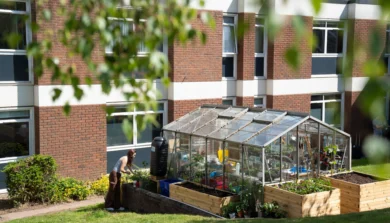
Birmingham Newman Celebrates Green Week 2026 with Campus‑Wide Events
Birmingham Newman will host its annual Green Week from 23 to 27 February 2026, bringing…
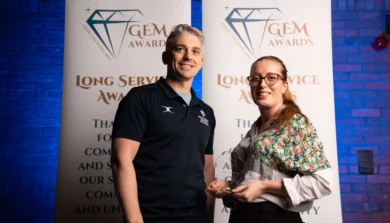
Research that makes a difference: Mark Holland wins Most Impactful Project Award
In December, we held our Staff Awards, where we recognised the outstanding achievements of colleagues…

Sports Coaching students Deliver Coaching Sessions for Local Primary Pupils
Birmingham Newman University recently welcomed pupils from St Peter’s Primary School to campus as part…

Vice-Chancellor Professor Jackie Dunne awarded MBE in New Year Honours
Vice-Chancellor of Birmingham Newman University receives an MBE for services to Higher Education.

Birmingham Newman University Celebrates Staff Achievements at Annual Awards
Birmingham Newman University celebrates its staff at the Annual Staff Awards Celebration.

Book an open day
Find out about our next open day. Book now to secure your place.
Our Careers team provides tailored advice, placements and workshops to help you build confidence and prepare for life after university.?

Where This Course Can Take You.
Graduates of this degree are well-prepared for a variety of roles in education, youth work, health and social care across public, private and voluntary sectors. You may choose to work in areas such as family support, safeguarding, emotional wellbeing, mentoring or community outreach.
The course also supports progression into postgraduate study, including social work, counselling, psychotherapy or education. You will be equipped to contribute confidently within multi-agency teams and help improve outcomes for children, young people and families. Support from Birmingham Newman University’s Careers and Employability Service includes mentoring, networking opportunities and guidance on further study or employment.
Accreditations and Exemptions
This degree is academically rigorous and professionally relevant, preparing you for careers that require strong communication, ethical awareness and inclusive practice. The curriculum is developed in consultation with practitioners, educators and community organisations, reflecting current expectations across the sector.
As a student at Birmingham Newman University, you will benefit from a programme that is socially engaged, intellectually challenging and aligned with the evolving demands of work with children, young people and families. You will graduate prepared to contribute confidently to care, education and support services.
Courses we think you'll also like
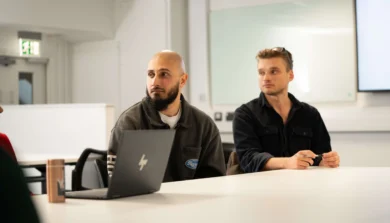
BA Counselling Studies and Working with Children, Young People and Families
- Start date:
- September 2026

BA Counselling Studies and Working with Children, Young People and Families (with Foundation Year)
- Start date:
- Various
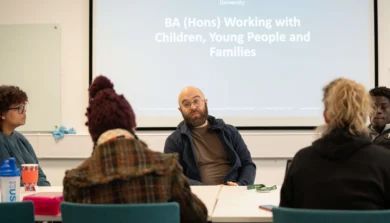
BA Single Honours Working with Children, Young People and Families (with Foundation Year)
- Start date:
- Various
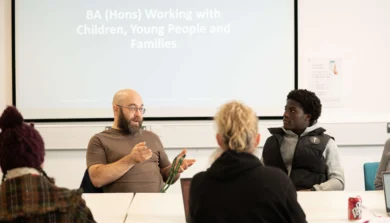
BA Single Honours Working with Children, Young People & Families (Top-Up)
- Start date:
- September 2026
